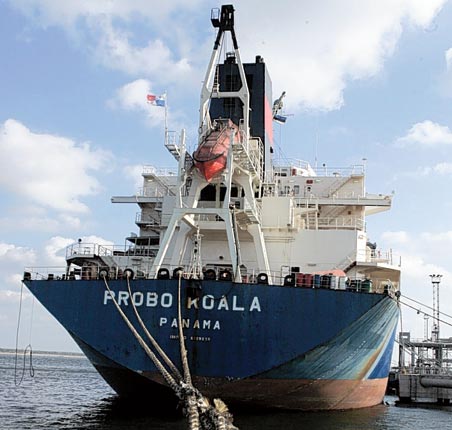Trafigura found guilty of toxic waste offence

Your support helps us to tell the story
This election is still a dead heat, according to most polls. In a fight with such wafer-thin margins, we need reporters on the ground talking to the people Trump and Harris are courting. Your support allows us to keep sending journalists to the story.
The Independent is trusted by 27 million Americans from across the entire political spectrum every month. Unlike many other quality news outlets, we choose not to lock you out of our reporting and analysis with paywalls. But quality journalism must still be paid for.
Help us keep bring these critical stories to light. Your support makes all the difference.
The oil trading company Trafigura was fined more than £800,000 after being found guilty of concealing the dangerous nature of toxic waste which was then illegally exported from Amsterdam and dumped in Africa.
The Swiss-based commodities giant, whose £651m profits last year mean that the punishment imposed by a Dutch court represents 0.12 per cent of its annual earnings, has consistently denied any wrongdoing in the incident four years ago, which led to tonnes of the foul-smelling sludge being dumped in the Ivory Coast by a sub-contractor.
But the company was convicted yesterday after facing criminal charges relating to the environmental scandal for the first time. A judge in Amsterdam imposed the €1m fine after finding that Trafigura had done what European regulations on hazardous waste were designed to prevent – "namely the export of waste to the third world and harming the environment".
A chartered tanker, the Probo Koala, was used by Trafigura to carry hundreds of tonnes of waste – claimed to be low-level "tank washings" – from an oil purification process to Amsterdam in July 2006. When the company was told the waste would cost substantially more to treat than estimated, the ship left the Netherlands and about a month later the slops were illegally dumped in the Ivorian port of Abidjan.
During a seven-week trial, prosecutors claimed that Trafigura had put "self-interest above people's health and environment" when it rejected the revised fee of €750 (£626) per tonne demanded by Amsterdam Port Services (APS) to treat the waste and subsequently paid €27 per tonne for disposal to Compagnie Tommy, an Ivorian operator which used a fleet of trucks to dump the slops under cover of darkness in the open air at sites around Abidjan. The Dutch court found that the slops contained mercaptans, a sulphur-based chemical with a noxious smell.
Trafigura has always maintained that Compagnie Tommy acted without its knowledge or approval, describing its actions as "reprehensible". Judge Frans Bauduin, sitting at Amsterdam District Court, said Trafigura had chosen to dispose of the waste in Ivory Coast "for commercial reasons". Noting the disparity between the disposal rates quoted by contractors in Europe and Africa, the judge said: "Under those circumstances Trafigura – which by that time knew of the exact composition [of the waste] – should never have agreed to its processing at such a price."
The €1m fine was half the amount requested by Dutch prosecutors, whose case related to Trafigura's actions in the Netherlands and not in the Ivory Coast.
The Amsterdam court also found a Trafigura employee, Naeem Ahmed, 43, a chemist at the company's London office who co-ordinated negotiations to process the waste in Amsterdam, was guilty of attempting to dispose of the slops in the Netherlands "while its dangerous nature was concealed".
Ahmed, who along with his employer was acquitted of forgery, was fined €25,000 and given a six-month suspended prison sentence. The Ukrainian captain of the Probo Koala, Sergiy Chertov, was sentenced to a five-month suspended jail term for the same offence and forgery by submitting a false declaration about the nature of the waste.
Trafigura said it was considering an appeal against its convictions. In a statement, it said: "While Trafigura is pleased to have been acquitted of the charge of forgery it is disappointed by the judges' ruling on the other two [charges] which it believes to be incorrect. Concerning the delivery of dangerous goods, it is important the court noted there was limited risk to human health... and indeed no damage occurred in Amsterdam."
Last year the company agreed in London's High Court to pay £30m in compensation to 31,000 Ivorians who claimed to have fallen ill after the slops were dumped. Both parties accepted that the waste, at worst, caused flu-like symptoms and could not have caused more serious injuries or deaths.
Subscribe to Independent Premium to bookmark this article
Want to bookmark your favourite articles and stories to read or reference later? Start your Independent Premium subscription today.
Join our commenting forum
Join thought-provoking conversations, follow other Independent readers and see their replies
Comments